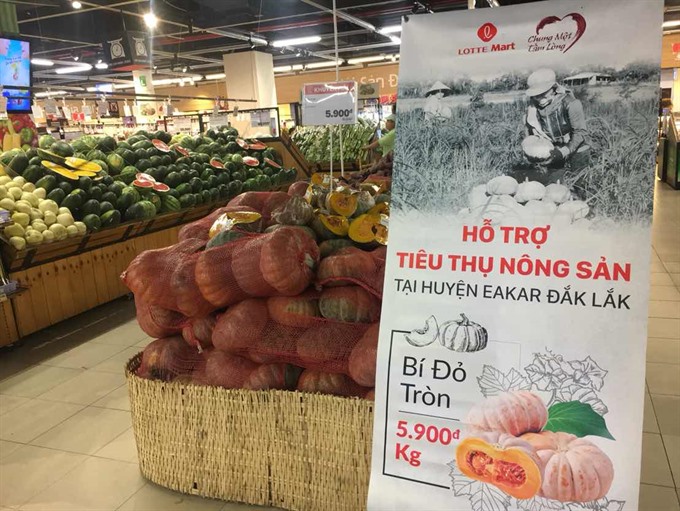 Economy
Economy

Korean supermarket chain Lotte Mart has bought more than 10 tonnes of pumpkins and five tonnes of watermelons from distressed farmers facing declining prices because of a bumper crop in Đắk Lắk and Quảng Nam provinces.
 |
| Lotte Mart has bought pumpkins from farmers facing low prices after a bumper harvest in Đắk Lắk District’s Cư Yang Commune. The supermarket chain is selling the pumpkins at all of its 13 shopping malls and hypermarkets. — VNS Photo |
HCM CITY – Korean supermarket chain Lotte Mart has bought more than 10 tonnes of pumpkins and five tonnes of watermelons from distressed farmers facing declining prices because of a bumper crop in Đắk Lắk and Quảng Nam provinces.
Lotte Mart plans to increase the purchase volume to 50 tonnes of pumpkins.
To help farmers, the supermarket has paid them more than the price offered by traders.
Big C supermarkets have also bought pumpkins from farmers in Đắk Lắk District’s Cư Yang Commune.
Last Friday, the supermarket began selling pumpkins bought from farmers in Cư Yang Commune at VNĐ4,900 per kg at its stores in the south.
The supermarket is expected to buy 60 tonnes of pumpkins within a week.
Nguyễn Mạnh Hùng, chairman of the Cư Yang People’s Committee, said Cư Yang commune in Eakar District was struggling the most.
Ethnic minority groups account for 42 per cent of the commune’s population. Agriculture is the main source of farmers’ incomes.
The commune has 3,200ha of farmland, with rice, maize, soybean and pumpkin the main crops.
This year, the farmers in the commune grew pumpkin on about 110ha, with productivity estimated at 20 tonnes per hectare.
The price fell to VNĐ800 to VNĐ1,500 per kg, but farmers were still unable to sell their product.
Hùng attributed the situation to the shortage of companies specialising in purchasing farm produce in the area.
In Quảng Nam Province, watermelon prices fell from VNĐ8,000 per kg earlier this year to VNĐ1,000-VNĐ1,500 per kg, but demand plunged, leaving farmers with huge unsold stocks. — VNS




